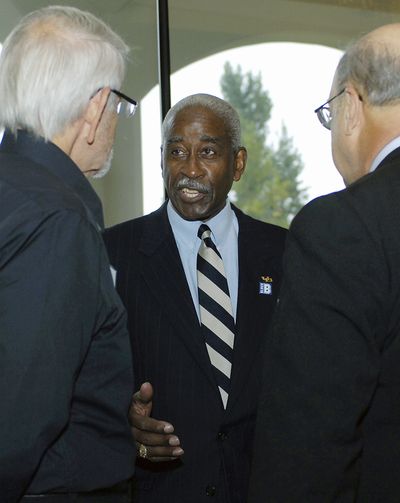Buffalo honors ’58 team
Bulls stood up by refusing bowl invite 50 years ago

BUFFALO, N.Y. – Willie Evans and the 1958 Buffalo Bulls are finally going to a bowl game.
In what’s proving to be a fitting tribute celebrating the 50th anniversary of a team that took a courageous stand against segregation, Evans and 20 or so teammates will be honored during the International Bowl on Jan. 3 in Toronto when Buffalo makes the first bowl appearance in school history 50 years after it first got a bid.
“We’ll be there,” Evans said. “It’s a wonderful gesture on behalf of the university in all respects. And it’s rekindling a lot of fond memories with the fellows I played with.”
Evans was on the first – and until this year, only – Buffalo team invited to a bowl game. But that changed when Bulls players unanimously rejected an invitation to compete in the 1958 Tangerine Bowl because of a rule that barred black players from competing with white players on the same field.
Buffalo had two black players who would have otherwise been left behind: Evans, the star halfback, and Mike Wilson.
Who could have imagined that Buffalo – a team that won 17 games since joining the Mid-American Conference in 1999 – would suddenly blossom into a power this year? Not only did the Bulls (8-5) win their first East Division title but, they went on to upset previously undefeated Ball State in the MAC championship game two weeks ago, and got a spot in the game against Connecticut.
“Surely, we did not have anything to do with this,” Evans said. “The irony of the situation, you know sometimes things just unfold that way unbeknownst to you.”
What’s special is how the 1958 team has re-emerged in the spotlight after nearly being forgotten.
“It makes all of us feel special,” said Bulls coach Turner Gill, one of four black coaches in the major-college ranks. “It’s just not the 2008 football team that’s the significant thing here, and that’s what’s so great about it. We’re all connected to them as far as the 1958 team.”
The 1958 team will be honored during a pep rally in Toronto the day before the game, and are expected to be recognized in some fashion during the game. The players are also attracting international media attention – the Canadian Broadcasting Corporation came to Buffalo to conduct interviews this past week.
Jack Dempsey, an offensive tackle on the ’58 team, has been floored by the attention.
“It’s overwhelming in a way that it would turn out this way,” Dempsey said. … We got here after a long and circuitous trip. But we got here. I’m not an emotional person, but I think it will really touch home. Not to be fatalistic, but it’ll be our last ride together, and that has significance.”
Evans blushes from the attention, because he and his teammates never made much about not playing in the bowl game in the first place. Their confrontation with racism and how they dealt with it has instead brought the members closer, building a tight bond that has stuck as the teammates hold reunions at least once a year.
“Believe me, there’s no reward necessary,” Evans said. “The life experience that we’ve had together has been great all these years.”
And yet Evans can’t discount the significance of what happened.
“The newsworthiness of the story, the accolades that we’re receiving, you can say the team did something correct,” he said. “We were a bunch of young men, foolish young men, but we were able to do something that was reflective of the better aspects of society – and we can all appreciate that.”
Evans learned how much appreciation there is after he entered the Bulls locker room shortly after they won the MAC title, and was approached by several players from the current team.
“They came up to me and said, ’This was for you guys,”’ Evans said. “These young men are tired from what they did on the field, and to have the energy to reflect in such a way, it’s humbling.”